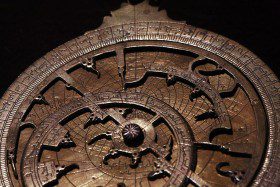Student Event
Owen Cornwall, Columbia University
This talk will discuss the history of the astrolabe in South Asia between 1200-1600CE. As the most important astronomical instrument in the medieval period, the history of the astrolabe in Europe is fairly well known. The history of the astrolabe in South Asia, however, contains many intriguing gaps and puzzling questions. This talk will outline some of these questions while discussing the ways that the astrolabe figured in the political and literary imaginations of medieval South Asia. It will argue that the Sultans of Delhi positioned themselves as the second coming of the Greeks (particularly Alexander the Great, himself directly associated with the astrolabe in Persian literature) in order to emphasize the civilizational benefits of Islamicate empire in India, including an increased control over the powers of the stars. Through a deep engagement with (and critique of) Ptolemy’s Almagest, Arabic (and later Persian) astral sciences had developed a number of advances over their Sanskrit counterparts, which itself did not have many of the key advances necessary for the development of the astrolabe. As a result, a new genre of Sanskrit astronomy, Tājika-śāstra (The Teachings of the Muslims) was developed by a number of Jains (and later Brahmins) between 1150-1600 to incorporate Perso-Arabic concepts into Sanskrit astronomical models, a rare example of translation of foreign language terminology into Sanskrit during the premodern period.
Cosponsored with the Early Sciences Working Group, the South Asia Institute and South Asia Across Disciplines

